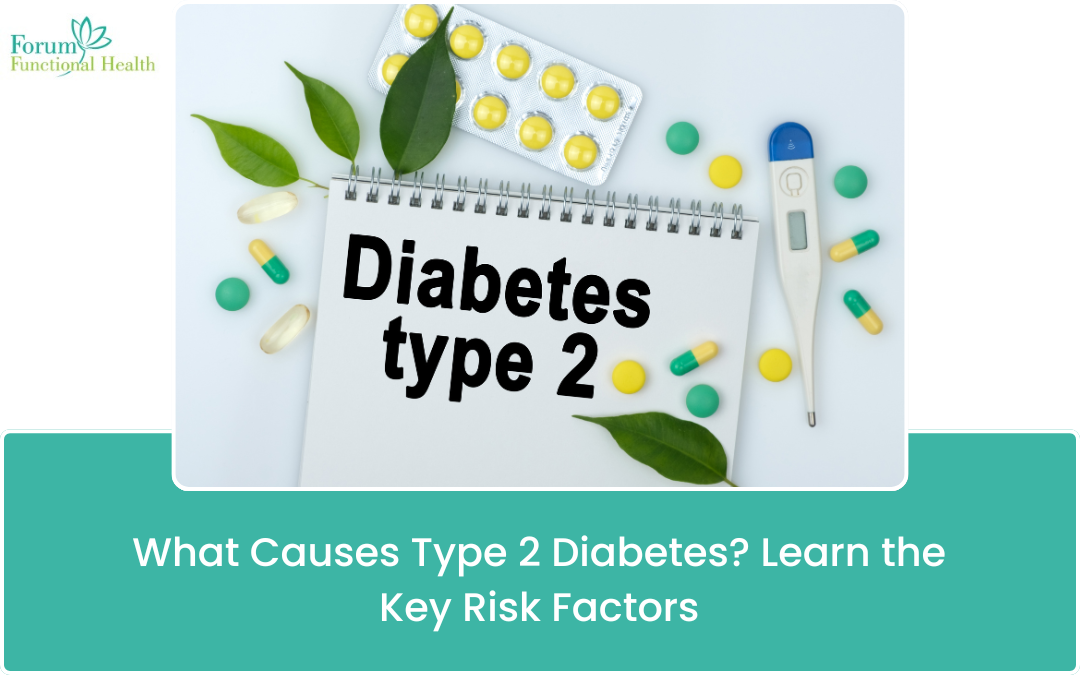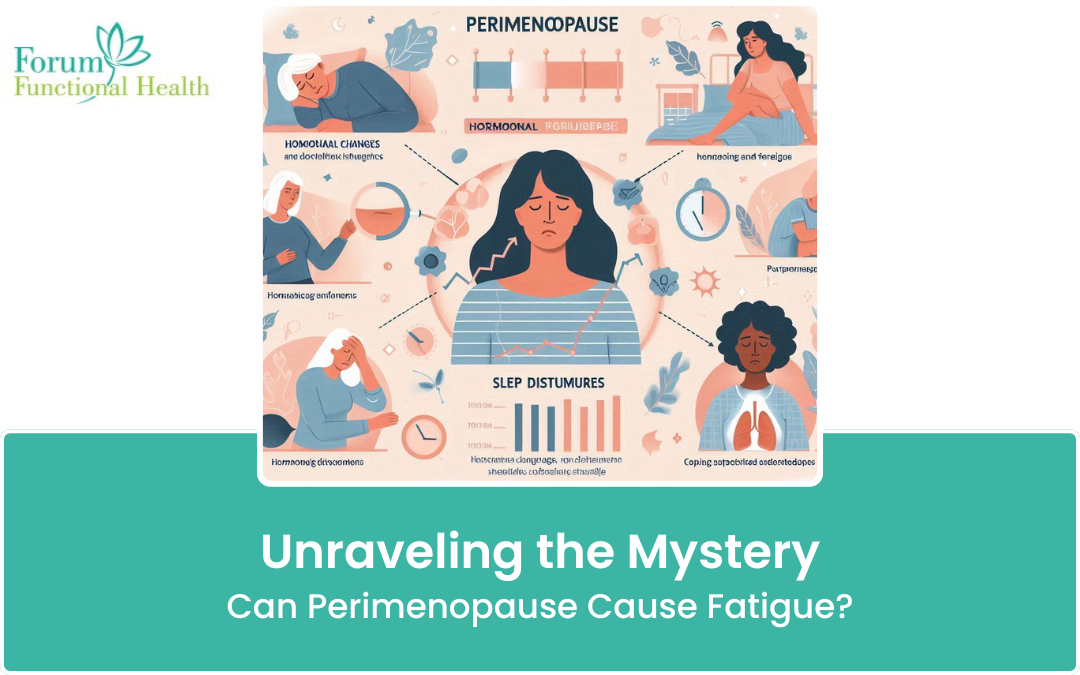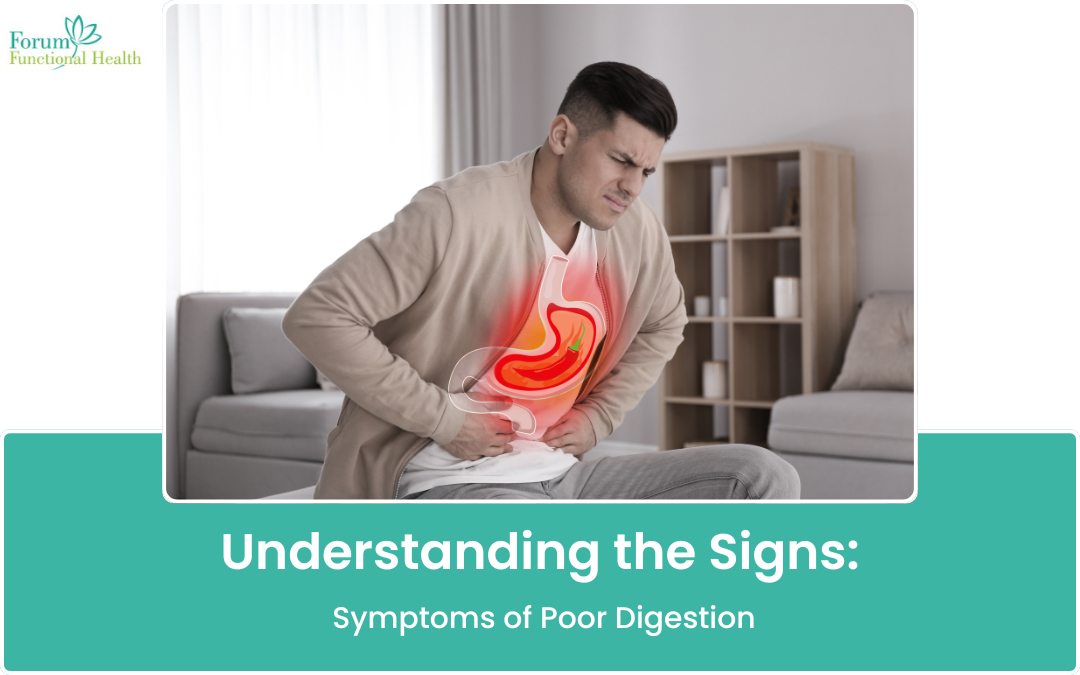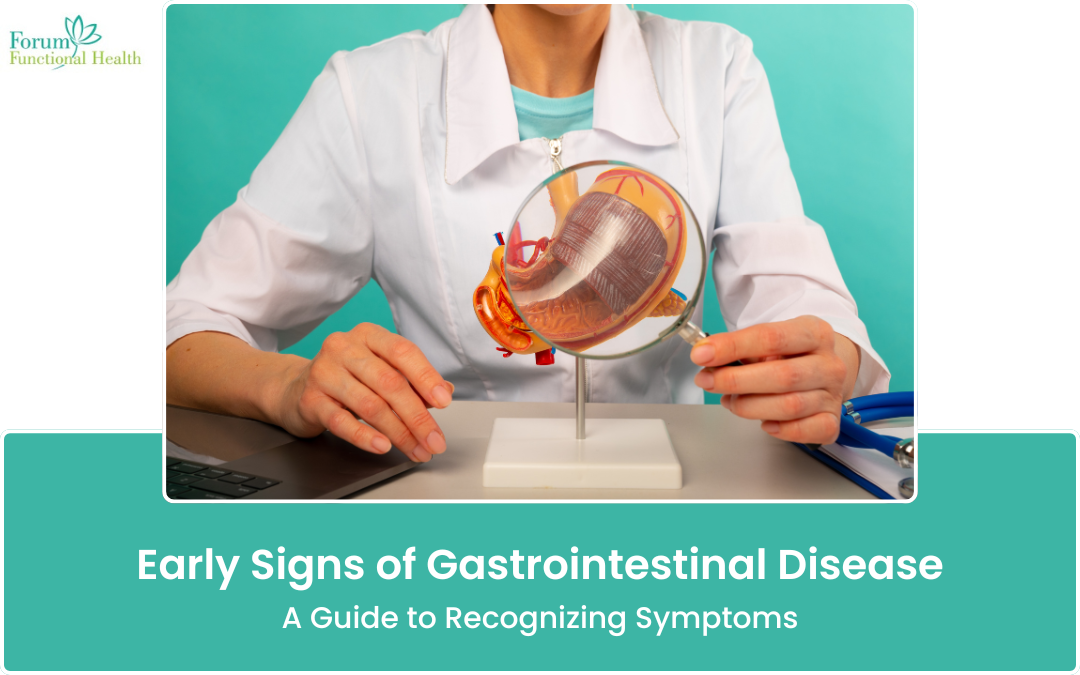
by Forum Functional Health Center | May 16, 2024 | Diabetes Management
Ever felt like you could practically power a lightbulb with all the sweets you’ve eaten? Let’s talk about Type 2 Diabetes, a condition that affects how your body uses sugar (glucose) for energy. While it might sound scary, knowledge is power! So, grab a comfy chair, and let’s dive into what causes Type 2 Diabetes and how to stay healthy, McKinney-style!
The Sweet on Type 2 Diabetes:
Imagine your body is a giant mansion, and sugar is the special guest. Normally, a hormone called insulin acts as the doorman, ushering sugar into your cells to be used for energy. But with Type 2 Diabetes, things get a bit out of whack. Here’s the breakdown:
- Insulin Resistance: The “doorman” (insulin) isn’t as effective, making it harder for sugar to enter your cells.
- High Blood Sugar: This sugar party spills over into your bloodstream, leading to all sorts of problems.
Picture this: You’re at the helm of your health, steering through the complexities of modern life in McKinney, Texas. Amidst the hustle and bustle, it’s crucial to be well-informed about the intricate web of factors that can predispose you to Type 2 Diabetes.
So, what exactly causes Type 2 Diabetes? Let’s delve into the nitty-gritty details:
- Lifestyle Choices: Your lifestyle can significantly influence your risk of developing Type 2 Diabetes. Sedentary habits, poor dietary choices high in processed sugars and unhealthy fats, and lack of regular physical activity can tip the scales towards diabetes.
- Genetic Predisposition: While lifestyle factors play a pivotal role, genetics also come into play. If you have a family history of Type 2 Diabetes, you may be genetically predisposed to the condition. However, genetics alone don’t seal your fate – lifestyle modifications can make a substantial difference.
- Obesity and Weight Gain: Excess weight, especially around the abdominal region, is closely linked to Type 2 Diabetes. The adipose tissue, particularly visceral fat, releases hormones and inflammatory substances that can disrupt insulin sensitivity, paving the way for diabetes.
- Insulin Resistance: A key player in Type 2 Diabetes, insulin resistance occurs when your body’s cells become less responsive to insulin’s action, leading to elevated blood sugar levels. Factors such as obesity, physical inactivity, and unhealthy dietary patterns contribute to insulin resistance.
- Age and Ethnicity: Age is an inevitable factor, with the risk of Type 2 Diabetes increasing as you grow older. Additionally, certain ethnic groups, including African Americans, Hispanics, Native Americans, and Asian Americans, are at a higher risk of developing the condition.
Now, armed with the knowledge of these risk factors, it’s crucial to take proactive steps towards prevention and management. At Forum Functional Health Center, best Functional health center in McKinney, Texas, we’re dedicated to empowering individuals like you to take control of your health journey.
Our comprehensive approach to Type 2 Diabetes treatment in McKinney, TX, integrates cutting-edge functional medicine practices, personalized nutrition plans, targeted supplementation, and lifestyle modifications tailored to your unique needs. Together, we’ll embark on a transformative journey toward optimal health and vitality.
Remember, knowledge is power. By understanding the root causes of Type 2 Diabetes and adopting proactive measures, you can pave the way for a healthier, happier future.
Ready to take the first step towards a life free from the shackles of diabetes? Reach out to Forum Functional Health Center today and embark on your journey to vibrant health and vitality.
Let’s rewrite your health story – together.
Contact Forum Functional Health Center to learn more about our innovative approach to Type 2 Diabetes treatment in McKinney, TX. Your journey to optimal health begins here.
Read More:-Understanding The Importance of Blood Sugar Monitoring in Diabetes Management

by Forum Functional Health Center | May 13, 2024 | Weight Management
Embarking on a journey towards weight loss and better health can be daunting, but with the right support and guidance, it becomes achievable. In McKinney, Texas, the Forum Functional Health Center, best Functional Health Center in McKinney Texas, offers comprehensive weight management services designed to transform your health and life. Let’s explore how these services can make a difference.
Understanding Weight Management: Weight management is more than just shedding pounds; it’s about achieving a healthy balance that supports overall well-being. Effective weight management involves adopting sustainable lifestyle changes, including improvements in diet, exercise, and mindset.
The Role of Professional Guidance: Many individuals struggle to achieve lasting weight loss on their own. That’s where professional weight management services come in. At Forum Functional Health Center in McKinney, Texas, our team of experts provides personalized guidance and support to help you reach your goals.
Tailored Approach to Weight Loss: One size does not fit all when it comes to weight loss. That’s why our weight management services are tailored to meet your unique needs and preferences. Whether you’re looking to lose a few pounds or make significant lifestyle changes, we’re here to help you every step of the way.
Comprehensive Assessment: Before embarking on your weight loss journey, our team conducts a comprehensive assessment to understand your current health status, lifestyle habits, and weight loss goals. This allows us to develop a personalized plan that addresses your specific needs.
Nutritional Guidance: A healthy diet is a cornerstone of successful weight management. Our team provides expert nutritional guidance to help you make informed choices and develop healthy eating habits that support your weight loss goals.
Exercise Planning: Physical activity is essential for weight loss and overall health. We work with you to develop an exercise plan that fits your lifestyle and preferences, whether it’s through structured workouts, outdoor activities, or group fitness classes.
Behavioral Support: Changing habits and behaviors is key to long-term weight management success. Our team offers behavioral support and coaching to help you overcome obstacles, stay motivated, and develop sustainable habits that support your health and well-being.
Ongoing Monitoring and Support: Weight management is a journey, not a destination. We provide ongoing monitoring and support to help you stay on track and make adjustments as needed. Whether you need encouragement, accountability, or guidance, we’re here for you every step of the way.
Contact Us: Ready to transform your health and life with our weight management services in McKinney, Texas? Contact Forum Functional Health Center today to schedule a consultation. Let us help you achieve your weight loss goals and live your best life.
Conclusion: Weight loss management services offer a holistic approach to achieving lasting results. With personalized guidance, support, and a tailored plan, you can transform your health and life for the better. If you’re in McKinney, Texas, the Forum Functional Health Center is here to help you on your journey to better health and well-being.
Also Read:- How Stress Can Impact Your Weight Loss Journey

by Forum Functional Health Center | May 10, 2024 | Menopause & Perimenopause
Welcome to the Forum Functional Health Center’s blog, where we delve into topics that impact women’s health. Today, we’re uncovering the often-overlooked connection between perimenopause and fatigue. If you’re seeking perimenopause treatment in McKinney TX, you’re in the right place. Let’s explore how perimenopause can cause fatigue and what you can do about it.
Understanding Perimenopause and Its Symptoms:
Perimenopause marks the transition period before menopause when a woman’s body begins to produce less estrogen. This hormonal shift can lead to a myriad of symptoms, including hot flashes, mood swings, and yes, fatigue. As your body adjusts to fluctuating hormone levels, you may find yourself battling unexplained tiredness and low energy levels.
The Link Between Perimenopause and Fatigue:
So, can perimenopause cause fatigue? Absolutely. The hormonal fluctuations characteristic of perimenopause can disrupt your sleep patterns, leading to insomnia or poor-quality sleep. Additionally, declining estrogen levels can affect your metabolism and energy production, leaving you feeling drained and exhausted.
Recognizing the Signs: If you’re experiencing fatigue during perimenopause, you’re not alone. Many women overlook this symptom or attribute it to other factors, such as stress or aging. However, it’s essential to recognize the signs and address them proactively.
Common indicators of perimenopausal fatigue include:
- Persistent tiredness, even after a full night’s sleep
- Difficulty concentrating or focusing
- Increased irritability or mood swings
- Reduced motivation or interest in activities
- Physical symptoms such as muscle aches and headaches
Seeking Perimenopause Treatment in McKinney, Texas:
At the Forum Functional Health Center, we understand the unique challenges women face during perimenopause. Our experienced team specializes in providing personalized treatment plans tailored to your specific needs. Whether you’re struggling with fatigue or other perimenopausal symptoms, we’re here to help.
Our Approach to Perimenopause Treatment:
When it comes to addressing perimenopausal fatigue, we take a holistic approach focused on restoring balance to your body and mind. Our comprehensive treatment plans may include:
- Hormone therapy to regulate estrogen levels and alleviate symptoms
- Nutritional counseling to support optimal energy levels and overall health
- Stress management techniques such as mindfulness and relaxation exercises
- Sleep hygiene education to improve the quality of your restorative sleep
- Lifestyle modifications to enhance your physical activity and reduce fatigue-inducing habits
Empowering You to Thrive:
At the Forum Functional Health Center, the best Functional health center in McKinney Texas our goal is not just to manage your symptoms but to empower you to thrive during perimenopause and beyond. We believe in providing you with the knowledge, support, and resources you need to take control of your health and embrace this new chapter of life with vitality and confidence.
Conclusion:
In conclusion, perimenopause can indeed cause fatigue, but it doesn’t have to define your experience. By understanding the link between hormonal changes and tiredness, seeking appropriate treatment, and making positive lifestyle choices, you can effectively manage perimenopausal fatigue and reclaim your energy and vitality. If you’re in McKinney, Texas, and seeking perimenopause treatment, the Forum Functional Health Center is here to support you every step of the way. Contact us today to schedule a consultation and embark on your journey to renewed health and well-being.
Also Read:- Understanding the Changes: A Comprehensive Guide to PreMenopause, PeriMenopause, and Menopause for Every Woman

by Forum Functional Health Center | May 8, 2024 | Digestive Health
Good digestion is essential for overall health and well-being. When our digestive system isn’t functioning properly, it can lead to a variety of uncomfortable symptoms that affect our daily lives. In this article, we’ll delve into the signs and symptoms of poor digestion and explore how seeking digestive health services, such as those offered at Forum Functional Health Center in Texas, can help address these issues effectively.
Symptoms of Poor Digestion
Persistent Indigestion:
One of the most common symptoms of poor digestion is persistent indigestion. This can manifest as discomfort or pain in the upper abdomen, bloating, gas, and a feeling of fullness even after eating small amounts. If you find yourself frequently experiencing these symptoms, it may indicate underlying digestive issues that need attention.
Acid Reflux:
Acid reflux occurs when stomach acid flows back into the esophagus, causing a burning sensation in the chest (heartburn). While occasional heartburn is normal, frequent or severe episodes could be a sign of gastroesophageal reflux disease (GERD), a condition that requires medical intervention. Digestive health services offered at Forum Functional Health Center in McKinney, TX, can provide tailored treatment plans to manage acid reflux effectively.
Irregular Bowel Movements:
Another telltale sign of poor digestion is irregular bowel movements. This can include constipation, diarrhea, or alternating between the two. Healthy digestion relies on a balanced diet, adequate hydration, and regular bowel habits. If you’re experiencing persistent changes in your bowel movements, it’s essential to consult with a healthcare professional at a functional health center in McKinney, TX, like Forum Functional Health Center.
Nutritional Deficiencies:
Poor digestion can also lead to nutritional deficiencies since your body may struggle to absorb essential nutrients from food. This can result in fatigue, weakness, brittle hair and nails, and even mood changes. By addressing digestive issues and optimizing nutrient absorption, you can improve your overall health and well-being.
Unexplained Weight Changes:
Unexpected weight changes, whether gain or loss, can be a sign of underlying digestive issues. Poor digestion can affect metabolism and nutrient absorption, leading to fluctuations in weight. If you’re experiencing unexplained changes in weight despite maintaining a consistent diet and lifestyle, it’s crucial to seek professional guidance from a digestive health service provider in McKinney, TX.
Conclusion:
Maintaining good digestive health is vital for overall wellness. By recognizing the signs and symptoms of poor digestion and seeking help from qualified professionals at Forum Functional Health Center in McKinney, TX, you can address underlying issues and improve your quality of life. Don’t ignore digestive discomfort—take proactive steps towards better health today.
Also Read:-Early Signs of Gastrointestinal Disease: A Guide to Recognizing Symptoms and Seeking Treatment in McKinney, TX

by Forum Functional Health Center | May 7, 2024 | Gastrointestinal
Gastrointestinal (GI) diseases can be insidious, often manifesting with subtle symptoms that may go unnoticed until they escalate into more serious issues. Whether it’s discomfort after meals, persistent bloating, or irregular bowel movements, understanding the early signs of GI disease is crucial for timely intervention and effective management. In McKinney, TX, residents have access to exceptional healthcare services, including specialized treatment for gastrointestinal conditions at Forum Functional Health Center. Let’s delve into the nuances of gastrointestinal health, recognize the warning signs, and explore the avenues for seeking gastrointestinal treatment in McKinney, TX.
Understanding Gastrointestinal Health:
The gastrointestinal system, comprising the stomach, intestines, liver, gallbladder, and pancreas, plays a vital role in digestion and nutrient absorption. When this intricate system encounters disruptions or diseases, it can lead to a myriad of symptoms affecting daily life. Common gastrointestinal diseases include gastroesophageal reflux disease (GERD), irritable bowel syndrome (IBS), inflammatory bowel disease (IBD), and gastrointestinal cancers.
Recognizing Early Signs:
Early detection of gastrointestinal issues significantly improves treatment outcomes. Being vigilant about subtle changes in your body can help catch potential problems before they escalate. Here are some common early signs of gastrointestinal disease:
- Persistent Abdominal Discomfort: Chronic abdominal pain, cramping, or discomfort after eating may indicate underlying gastrointestinal issues.
- Changes in Bowel Habits: Pay attention to changes in bowel movements such as diarrhea, constipation, or irregularity, as they could signify gastrointestinal disorders.
- Persistent Bloating or Gas: Excessive bloating or gas that persists beyond occasional discomfort warrants investigation.
- Acid Reflux: Frequent heartburn or acid reflux, especially after meals or when lying down, may indicate GERD.
- Unexplained Weight Loss: Significant and unexplained weight loss without changes in diet or exercise could be a sign of gastrointestinal problems.
- Rectal Bleeding: Blood in the stool or rectal bleeding should never be ignored and requires immediate medical attention.
Seeking Treatment at Forum Functional Health Center:
Residents of McKinney, TX, are fortunate to have access to cutting-edge healthcare services at Forum Functional Health Center. As a leading Functional health center in Texas, they specialize in diagnosing and treating a wide range of gastrointestinal conditions. Their team of experienced healthcare professionals offers personalized treatment plans tailored to individual needs, ensuring comprehensive care and support throughout the patient’s journey.
At Forum Functional Health Center, patients can expect:
- Comprehensive Diagnostic Services: Utilizing state-of-the-art technology, the center offers a range of diagnostic tests to accurately identify gastrointestinal conditions.
- Multidisciplinary Approach: The center’s team consists of gastroenterologists, nutritionists, and other specialists who collaborate to provide holistic care addressing all aspects of the patient’s health.
- Advanced Treatment Options: From medication management to minimally invasive procedures, patients have access to the latest advancements in gastrointestinal treatment to achieve optimal outcomes.
- Patient-Centered Care: Forum Functional Health Center prioritizes patient education and empowerment, ensuring individuals are actively involved in their treatment decisions and wellness goals.
Conclusion:
Recognizing the early signs of gastrointestinal disease is the first step towards proactive healthcare management. In McKinney, TX, residents can rely on Forum Functional Health Center for expert diagnosis, treatment, and support for a wide range of gastrointestinal conditions. By staying vigilant about symptoms and seeking timely medical attention, individuals can safeguard their gastrointestinal health and enjoy a better quality of life. Remember, your health is your greatest asset – prioritize it today for a healthier tomorrow.
Also Read:- How to Restore Gut Health Naturally: Strategies for Managing Common Digestive Issues

by Forum Functional Health Center | May 3, 2024 | Children with Hyperactivity & ADHD
Hyperactivity in children can present unique challenges for parents, educators, and healthcare providers alike. Understanding the signs, causes, and effective treatment options is crucial for supporting children with hyperactivity. In McKinney, Texas, the Forum Functional Health Center best Functional Health Center in McKinney Texas, offers comprehensive care tailored to meet the needs of hyperactive children and their families.
Supporting Your Child with Hyperactivity
Supporting your child with hyperactivity requires patience, understanding, and a willingness to adapt. Here are some strategies to help:
- Create a Structured Environment: Establish a consistent daily routine to help your child feel secure.
- Encourage Physical Activity: Regular exercise can help manage hyperactivity.
- Provide Positive Reinforcement: Recognize and reward your child’s efforts to manage their behavior.
- Seek Professional Guidance: Don’t hesitate to consult with professionals at the Forum Functional Health Center for personalized advice.
Understanding Hyperactivity
Hyperactivity is characterized by excessive activity, impulsivity, and difficulty maintaining attention. While it’s normal for children to have high energy levels, hyperactivity goes beyond typical behavior and can significantly impact daily functioning. Common signs of hyperactivity include restlessness, fidgeting, interrupting others, and difficulty staying focused.
Causes of Hyperactivity
There is no single cause of hyperactivity, but a combination of genetic, environmental, and neurological factors may contribute to its development. Genetics play a significant role, with hyperactivity often running in families. Additionally, factors such as prenatal exposure to toxins, premature birth, and early childhood trauma can increase the risk of developing hyperactivity.
- Difficulty sitting still
- Excessive talking
- Difficulty waiting their turn
- Difficulty playing or engaging in leisure activities quietly
- Easily distracted
- Often fidgets or squirms
Hyperactivity Treatment in McKinney, Texas
For parents in McKinney, Texas, seeking treatment for their hyperactive child, the Forum Functional Health Center stands out as a leading provider of comprehensive care. you can contact for Hyperactivity Treatment in McKinney, Texas
Forum Functional Health Center: Your Partner in Hyperactivity Treatment
The Forum Functional Health Center is dedicated to providing personalized care for children with hyperactivity. Their team of experienced professionals uses a holistic approach to address the root causes of hyperactivity, ensuring a supportive environment for your child to grow and thrive.
Services Offered
- Behavioral Therapy: Techniques to help manage hyperactivity and improve focus.
- Medication Management: Guidance on appropriate medications to manage symptoms.
- Educational Support: Assistance in understanding and managing hyperactivity in the classroom.
- Family Therapy: Strategies to support the entire family in managing hyperactivity.

by Forum Functional Health Center | May 1, 2024 | Fatigue
Have you ever experienced a moment where you suddenly feel weak for no apparent reason? It’s a perplexing sensation, leaving you wondering what could be causing it and how to regain your energy. This phenomenon, often referred to as sudden weakness or fatigue, can stem from various factors, ranging from lifestyle choices to underlying health conditions. In this blog post, we’ll delve into the potential causes of sudden weakness and explore effective treatment options, including those available at the Forum Functional Health Center in McKinney, TX.
What Suddenly Feel Weak?
- Dehydration: One of the most common reasons for sudden weakness is dehydration. Even mild dehydration can lead to fatigue and lethargy as it affects the body’s ability to transport nutrients and oxygen to cells effectively.
- Lack of Sleep: Sleep plays a crucial role in maintaining overall health and energy levels. Chronic sleep deprivation or poor sleep quality can leave you feeling weak and exhausted during the day.
- Nutritional Deficiencies: Your body needs a balanced diet to function optimally. Deficiencies in essential nutrients such as iron, vitamin D, vitamin B12, and magnesium can contribute to feelings of weakness and fatigue.
- Stress and Anxiety: Mental health plays a significant role in physical well-being. Chronic stress and anxiety can drain your energy levels and leave you feeling weak and depleted.
- Underlying Health Conditions: Sudden weakness can also be a symptom of underlying health issues such as thyroid disorders, diabetes, heart disease, anemia, or chronic fatigue syndrome. It’s essential to consult with a healthcare professional to rule out any serious medical conditions.
Treatment Options for Sudden Weakness
- Hydration: Drinking an adequate amount of water throughout the day is essential for combating dehydration and maintaining optimal energy levels. Aim for at least eight glasses of water per day, more if you’re engaging in strenuous physical activity or experiencing hot weather.
- Sleep Hygiene: Establishing healthy sleep habits can help improve the quality and duration of your sleep. Create a relaxing bedtime routine, avoid screens before bed, and ensure your sleep environment is conducive to rest.
- Nutritional Supplements: If you suspect a nutritional deficiency, consider incorporating supplements into your diet under the guidance of a healthcare professional. Iron, vitamin D, vitamin B12, and magnesium supplements can help address deficiencies and boost energy levels.
- Stress Management: Implementing stress-reduction techniques such as mindfulness, meditation, yoga, or deep breathing exercises can help alleviate feelings of stress and anxiety, thereby improving energy levels.
- Medical Evaluation: If your sudden weakness persists or is accompanied by other concerning symptoms, it’s crucial to seek medical attention. A healthcare provider can conduct a thorough evaluation, including blood tests and other diagnostic procedures, to identify any underlying health conditions.
Forum Functional Health Center in McKinney, TX
If you’re experiencing persistent weakness or fatigue and are seeking comprehensive healthcare solutions, consider visiting the Forum Functional Health Center in McKinney, TX. At Forum Functional Health, we take a holistic approach to healthcare, addressing the root causes of your symptoms and providing personalized treatment plans tailored to your individual needs.
Our team of experienced healthcare professionals, including doctors, nutritionists, and wellness coaches, will work closely with you to identify any underlying health issues contributing to your weakness and fatigue. Through advanced diagnostic testing and integrative treatment modalities, we aim to restore your energy levels and improve your overall quality of life.
Whether you’re struggling with chronic fatigue, nutritional imbalances, or stress-related issues, the Forum Functional Health Center is here to support you on your journey to optimal health and vitality.
Don’t let sudden weakness hold you back from living your best life. Take proactive steps towards addressing the root causes of your symptoms and reclaim your energy and vitality today.
If you’re in McKinney, TX, and seeking fatigue treatment, contact the Forum Functional Health Center to schedule a consultation and start your journey towards renewed health and wellness.
In conclusion, sudden weakness can be a concerning and disruptive experience, but it’s essential to recognize that it often stems from manageable factors such as dehydration, lack of sleep, nutritional deficiencies, stress, or underlying health conditions. By addressing these factors through lifestyle modifications, nutritional support, stress management, and medical intervention when necessary, you can overcome sudden weakness and regain your energy and vitality.
Remember, your health is your greatest asset, and investing in it pays dividends in every aspect of your life. Take the first step towards a healthier, more energized future today.
Also Read:- Understanding ADHD in Children: A Comprehensive Guide to Symptoms, Causes, and Treatment

by Forum Functional Health Center | Apr 29, 2024 | Menopause & Perimenopause
Life throws a lot at us, and for women, that often includes a period of transition called Premenopause. It’s the time leading up to menopause, when your body starts preparing to say goodbye to your fertile years. This transition can come with a whole new set of questions and, let’s be honest, sometimes anxieties.
So, how do you know if you’re in premenopause? Buckle up, because this blog post is here to be your guide! We’ll explore the signs and symptoms, what to expect, and even touch on treatment options (looking at you, McKinney, Texas!).
But First, What is Premenopause?
Premenopause is like the warm-up act for menopause. During this time, your ovaries slowly start producing less estrogen, a key hormone in your reproductive system. This decline can trigger a range of physical and emotional changes. The good news? Premenopause can last anywhere from a few years to a decade, so you have some time to adjust.
Are You Pre-Menopausal? Decoding the Signs
Premenopause doesn’t come with a flashing neon sign, but your body has ways of whispering (or sometimes shouting) that things are changing. Here are some common symptoms to watch out for:
- Irregular Periods: This is a classic premenopause symptom. Your periods might become shorter, longer, heavier, or lighter. You might even skip a month or two entirely.
- Hot Flashes: These sudden bursts of heat that make you feel like you’re standing on a tropical beach (without the swimsuit) are a hallmark of premenopause and menopause. Night sweats are a close cousin, often happening during sleep.
- Mood Swings: Feeling like you’re on an emotional rollercoaster? Premenopause can mess with your hormones, leading to irritability, anxiety, or even depression.
- Sleep Disruptions: Trouble falling asleep, staying asleep, or waking up drenched in sweat? Premenopause can disrupt your sleep patterns, leaving you feeling tired and foggy.
- Vaginal Changes: You might experience dryness, itching, or burning in the vaginal area. This is due to a decrease in estrogen, which can affect lubrication.
- Changes in Libido: Your sex drive might take a dip during premenopause.
- Brain Fog: Feeling forgetful or having trouble concentrating? Premenopause can affect your cognitive function, making it harder to focus or remember things.
Also Read – A Comprehensive Guide to PreMenopause, PeriMenopause, and Menopause for Every Woman
It’s Not All Doom and Gloom!
While premenopause can bring some unwanted changes, it’s not all bad news. Here are some things to keep in mind:
- Premenopause is a natural part of life. Every woman goes through it.
- Knowledge is power. Understanding what’s happening to your body can help you manage symptoms.
- There are treatment options. We’ll get to those in a bit!
- You’re not alone. Many women experience premenopause, and there are resources available to help you navigate it.
Taking Charge: Treatment Options for Premenopause
If your premenopause symptoms are making life difficult, there are options! Here are a few approaches to consider:
- Lifestyle Changes: Exercise regularly, eat a healthy diet, and prioritize stress management. These can significantly improve your overall well-being and potentially lessen the impact of premenopause.
- Hormone Therapy (HT): This involves replacing the declining estrogen levels in your body with medication. HT can be very effective in managing symptoms like hot flashes, night sweats, and vaginal dryness. However, it’s important to discuss the risks and benefits with your doctor to see if it’s right for you.
- Complementary and Alternative Therapies (CAM): Some women find relief with acupuncture, herbal remedies, or other CAM therapies. Before trying any CAM therapy, it’s important to talk to your doctor to ensure it’s safe for you.
Looking for Support in McKinney, Texas?
If you’re in the McKinney area and seeking guidance through premenopause treas, consider consulting a healthcare professional specializing in functional health. Functional medicine focuses on the root cause of health issues and takes a holistic approach to treatment. This can be a great option for women seeking personalized solutions for managing their premenopause symptoms.
Beyond McKinney: Building Your Support Network
No matter your location, there are resources available to help you navigate premenopause. Here are a few ideas:
- Talk to your doctor. They can answer your questions, address your concerns, and recommend treatment options.
- Explore reliable online resources. Websites from reputable organizations like the North American Menopause Society and the National Institutes of Health offer trustworthy information on premenopause and menopause.
- Embrace self-care. Prioritize activities that nourish your mind, body, and spirit. This might include yoga, meditation,
- spending time in nature, or pursuing hobbies you enjoy.
Looking for Support in McKinney, Texas?
If you’re in the McKinney area and seeking guidance through premenopause, consider consulting a healthcare professional specializing in functional health. Functional medicine focuses on the root cause of health issues and takes a holistic approach to treatment. This can be a great option for women seeking personalized solutions for managing their premenopause symptoms. A great resource to explore could be the Forum Functional Health Center – don’t hesitate to reach out and see if they might be a good fit for you.
Remember, You Got This!
Premenopause can be a time of change and adjustment, but it doesn’t have to define you. By understanding the signs, exploring treatment options, and building a support network, you can navigate this transition with confidence and grace. Embrace this time as an opportunity to learn more about your body and prioritize your well-being. You are strong, capable, and in charge of your own health journey.
Bonus Tip: Keep a journal to track your symptoms and any lifestyle changes you make. This can be helpful in identifying patterns and seeing what works best for you.
So, there you have it! We hope this blog post has shed some light on the mysterious world of premenopause. If you’re experiencing any of the symptoms mentioned, don’t hesitate to reach out to a healthcare professional. Remember, knowledge is power, and with the right information and support, you can sail smoothly through premenopause and into the next exciting chapter of your life.
Read More:- The Impact of Stress on Perimenopausal Symptoms and How to Reduce It

by Forum Functional Health Center | Apr 26, 2024 | Depression
In today’s fast-paced world, the mental health of our youth is more crucial than ever. Depression among young individuals is a growing concern, impacting their overall well-being and daily functioning. Recognizing the signs and symptoms of youth depression is essential for timely intervention and support. In this article, we’ll explore the common indicators of depression in young people and discuss the importance of seeking treatment from specialized providers like the Forum Functional Health Center, offering depression treatment in McKinney TX, with a focus on functional medicine.
Signs and Symptoms of Youth Depression:
Depression in youth may present differently than in adults, making it vital for parents, educators, and caregivers to be aware of the signs. Here are some common signs and symptoms to watch out for:
- Persistent Sadness or Irritability:
Noticeable and prolonged feelings of sadness, hopelessness, or irritability that impact daily life.
- Withdrawal from Activities:
Loss of interest in activities once enjoyed, such as hobbies, sports, or spending time with friends and family.
- Changes in Sleep Patterns:
Insomnia, oversleeping, or disrupted sleep patterns, leading to fatigue and difficulty in functioning during the day.
- Changes in Appetite or Weight:
Significant changes in appetite, resulting in weight loss or gain, without any apparent cause.
- Fatigue or Loss of Energy:
Persistent feelings of tiredness, lethargy, or lack of motivation, even after adequate rest.
- Difficulty Concentrating:
Trouble focusing, making decisions, or remembering details, affecting academic or work performance.
- Physical Complaints:
Frequent complaints of headaches, stomachaches, or other unexplained physical symptoms, despite medical evaluations.
- Self-Harm or Suicidal Thoughts:
Engaging in self-harming behaviors or expressing thoughts of suicide, which require immediate intervention and support.
Recognizing these signs early on can pave the way for initiating conversations about mental health and seeking professional help.
Depression Treatment in McKinney, TX:
For those in McKinney, TX, experiencing youth depression, the Forum Functional Health Center, offers specialized treatment options and best Functional Medicine in McKinney TX, With a focus on functional medicine, their approach emphasizes personalized care tailored to the individual needs of each patient.
The center provides comprehensive evaluations to identify underlying factors contributing to depression, such as nutritional deficiencies, hormonal imbalances, or genetic predispositions. Treatment plans may include a combination of therapies, such as:
- Nutritional Counseling: Addressing dietary factors that may impact mood and mental health.
- Lifestyle Modifications: Incorporating stress-reduction techniques, exercise, and sleep hygiene practices.
- Therapy and Counseling: Providing individual or group therapy sessions to explore and address underlying emotional issues.
- Medication Management: When necessary, prescribing medications to alleviate symptoms and support overall well-being.
Conclusion:
Youth depression is a serious mental health concern that requires attention, understanding, and support from the community. By recognizing the signs and symptoms of depression in young individuals and seeking help from specialized providers like the Forum Functional Health Center in McKinney TX, we can ensure that our youth receive the care and support they need to thrive. Let’s prioritize mental health and work together to create a supportive environment where our youth can flourish.
Read More :- How to Cultivate Healthy Eating Habits to Boost Mood and Fight Depression

by Forum Functional Health Center | Apr 24, 2024 | Infertility
Polycystic Ovary Syndrome (PCOS) is a prevalent endocrine disorder affecting millions of women worldwide. Among its myriad of symptoms, infertility stands out as one of the most distressing and challenging aspects for those affected. Understanding why PCOS often leads to infertility is crucial not only for those grappling with the condition but also for healthcare providers seeking effective treatment strategies. In this article, we delve into the intricacies of PCOS-related infertility, shedding light on its underlying mechanisms and exploring potential avenues for treatment, including options available at Forum Functional Health for infertility treatment in McKinney TX.
The PCOS Puzzle: PCOS is a complex syndrome characterized by hormonal imbalances, ovarian dysfunction, and metabolic disturbances. These factors intertwine to disrupt the intricate processes involved in ovulation and fertility. The primary mechanisms through which PCOS contributes to infertility include hormonal imbalance, ovulatory dysfunction, and metabolic irregularities.
Hormonal Imbalance: Central to the pathology of PCOS is the dysregulation of hormones, particularly insulin and androgens. Insulin resistance, a common feature of PCOS, leads to elevated insulin levels, which in turn stimulate the ovaries to produce excess androgens such as testosterone. These elevated androgen levels disrupt the normal menstrual cycle and inhibit follicular development, impairing ovulation and reducing the chances of conception.
Ovulatory Dysfunction: Anovulation, or the absence of ovulation, is a hallmark feature of PCOS and a major contributor to infertility. In a typical menstrual cycle, the ovary releases a mature egg during ovulation, which is essential for conception. However, in women with PCOS, ovulation may not occur regularly or at all due to hormonal imbalances and follicular arrest. Without ovulation, the chances of conceiving naturally are significantly diminished.
Metabolic Irregularities: PCOS is often accompanied by metabolic abnormalities such as obesity, insulin resistance, and dyslipidemia, which further exacerbate infertility. Obesity, in particular, is strongly associated with PCOS and contributes to hormonal imbalances and insulin resistance, worsening ovulatory dysfunction. Additionally, metabolic disturbances can impair endometrial receptivity, making it more difficult for a fertilized egg to implant and establish a pregnancy.
Inflammation and Oxidative Stress: Chronic inflammation and oxidative stress have also been implicated in the pathogenesis of PCOS-related infertility. Women with PCOS often exhibit increased levels of inflammatory markers and oxidative stress, which can negatively impact ovarian function and embryo implantation. Addressing inflammation and oxidative stress may therefore be an important aspect of managing infertility in women with PCOS.
Management Strategies:
Addressing infertility in PCOS patients necessitates a multifaceted approach targeting the underlying hormonal imbalances, metabolic irregularities, and ovarian dysfunction. Lifestyle modifications, including dietary changes and regular exercise, are cornerstone interventions for improving insulin sensitivity, managing weight, and restoring hormonal balance. Pharmacological interventions such as oral contraceptives, insulin-sensitizing agents, and ovulation-inducing medications may be prescribed to regulate menstrual cycles and promote ovulation.
In cases where conventional treatments prove ineffective, assisted reproductive technologies (ART) offer viable alternatives for achieving pregnancy. Techniques such as ovulation induction, intrauterine insemination (IUI), and in vitro fertilization (IVF) can circumvent ovulatory dysfunction and facilitate conception in PCOS patients. Additionally, emerging therapies targeting specific molecular pathways implicated in PCOS pathogenesis hold promise for more targeted and effective management of infertility in the future.
Conclusion:
PCOS represents a complex interplay of hormonal, metabolic, and ovarian factors, culminating in infertility for many affected individuals. By unraveling the mechanisms underlying PCOS-related infertility, healthcare providers can devise more effective treatment strategies tailored to the unique needs of each patient. Through a combination of lifestyle modifications, pharmacological interventions, and assisted reproductive technologies, individuals with PCOS can navigate the challenges of infertility and realize their dreams of parenthood.
Read More:- Understanding the Facts: How Endometriosis Influences Infertility










